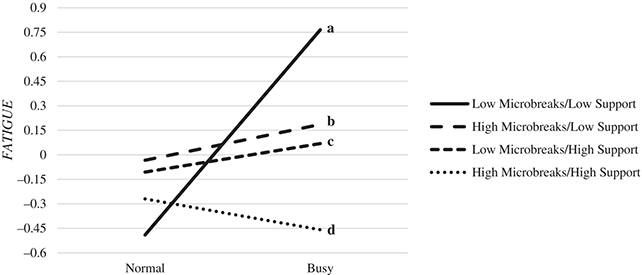In many jobs it can feel as if there are not enough hours on the working day, but a new study points in two effective ways to ward off fatigue: take regular microbreaks and receive support from a supervisor.
The study comes from researchers from Wake Forest University, Virginia Commonwealth University (VCU) and Northeastern University in the US and can help make the difference between sagging or increasing during a working afternoon.
Taking microbreaks and getting supervisor support had positive effects on the end of the day, as well as the subsequent sleep quality and the next day of energy, the researchers found. The use of both measures together proved to be the most effective in the fight against fatigue.

“First of all, microbreaks are a simple, cost -effective way to manage fatigue, especially when the workloads are high,” says VCU School of Business Accountant Lindsay Andiola. “Secondly, supervision support plays a crucial role in reducing fatigue.”
“Together, these two mechanisms offer the most substantial lighting for professionals who work through busy seasons or other stress periods.”
The researchers responded 44 accountants about their work habits before they organized a controlled experiment about fatigue and microbreaks with another 179 participants.
Both microbreaks and regular supervisor support were found to reduce fatigue. For the work accountants, the benefits of these interventions were only important in the busiest time of the year – which suggests that they are most useful when they are most needed, in times of higher stress.
What is more, the follow-up experiments revealed that microbreaks were also associated with improved accuracy during audits at work, something that is known to decrease when audit firms are exerted more pressure.
“Public accountants experience and struggle routinely with deadline pressure, long hours and important workloads,” the researchers write in their published paper.
“These job requirements lead to a high degree of fatigue and burnout, which can in the short term have a negative influence on the audit quality and can increase sales in the long term.”
Effective microbreaks can be as short as a minute, the researchers say: it can relate to reading a short news article or stop for a coffee, or taking some time to do some pieces. In the meantime, support from the supervisor can check in with employees, offering help and showing appreciation for what they do.
Although most employees have limited control over the activities of their manager, many can take responsibility for their fatigue levels by considering ways to break their workload with short moments of downtime. Although the study did not look at the optimum timings for microbreaks, their results were based on just one minute of breaks.
“By implementing these strategies, companies can improve both the well -being of employees and the quality of the audit, which ultimately promotes a more sustainable and more productive working environment,” the researchers write.
The research has been published in Contemporary accounting research.


